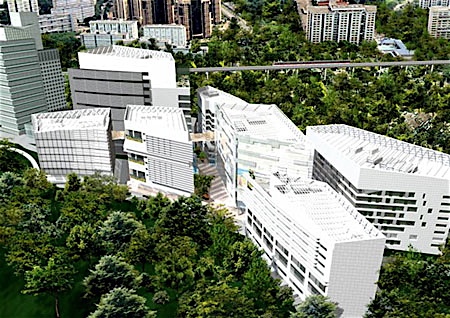Singapore filling void in stem-cell research — with “help” from George Bush
You can’t buy Wrigley’s Spearmint gum
in Singapore. But human embryonic stem cells? That’s a different
matter.

Biopolis
You can’t buy Wrigley’s Spearmint gum in Singapore. But human embryonic stem cells? That’s a different matter.
Last month a local business, ES Cell International, claimed to be the first company to produce human embryonic stem cell lines commercially in a way that made them suitable for clinical tests. Researchers can buy vials of stem cells online from ES Cell for $6,000 each.
Lately the tiny island state’s ambition of joining the ranks of Boston and the San Francisco Bay Area as a biotechnology hub has been getting a hand from an unexpected quarter: the White House. Bush administration policies that restrict U.S. government money for stem cell research have prompted an increasing number of top scientists to pack their bags and head for this equatorial city.
We’ve discussed this a couple of times, lately. There is a predictable minority in the United States whose attitude mirrors that of our Sun King. Maintaining a commitment to superstition and reaction is their priority.
Two of the most prominent American cancer researchers, Neal Copeland and Nancy Jenkins, are planning to arrive here next month to take posts at the Institute of Molecular and Cell Biology in Singapore. The husband and wife team, who worked for 20 years at the National Cancer Institute in Maryland, said politics and budget cuts had left financing in the United States too hard to come by.
“We wanted to be in a place where they are excited by science and things are moving upward,” Copeland said.
The centerpiece of Singapore’s biotechnology effort is the 500 million dollar Biopolis - a seven-building biomedical hive that opened in late 2003. It is outfitted with the latest high-technology equipment and features a bar, a day care center and an underground facility designed to house a quarter-million laboratory mice.
The authorities are now building a stem cell bank at Biopolis, which will be able to count on some of the world’s most liberal laws on human embryonic cell use. Researchers hope that stem cells, the all-purpose building blocks that eventually turn into specific tissue like bone, muscle or nerves, can be harnessed and used to treat injuries or medical defects. Scientists have found that stem cells from embryos have a greater flexibility and shelf life than those in adults.
Here we are — confronted with a government that stands above us and says research is immoral and, therefore, illegal. Who would be surprised when folks with dedicated careers leave for better opportunities?
I guess we're supposed to accept this as a new kind of Foreign Aid?
Posted: Thu - August 17, 2006 at 06:48 AM